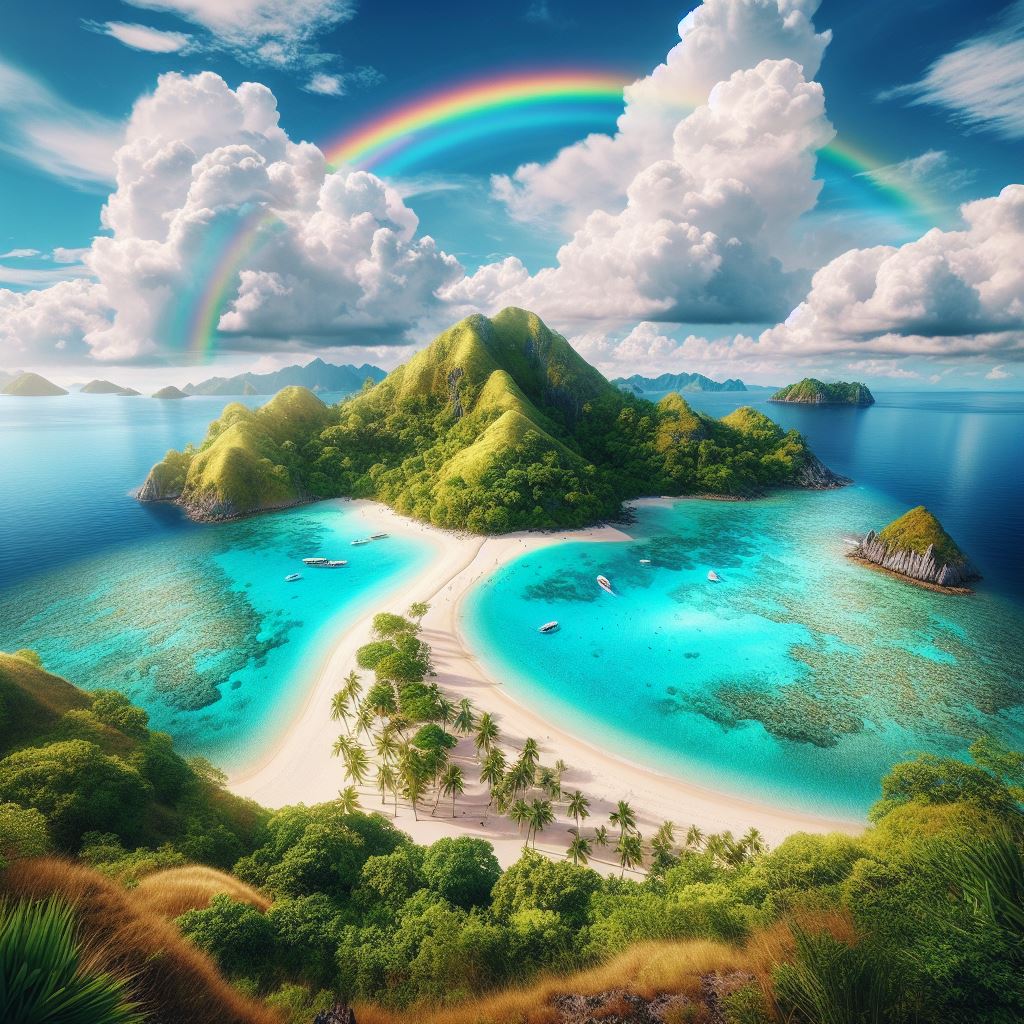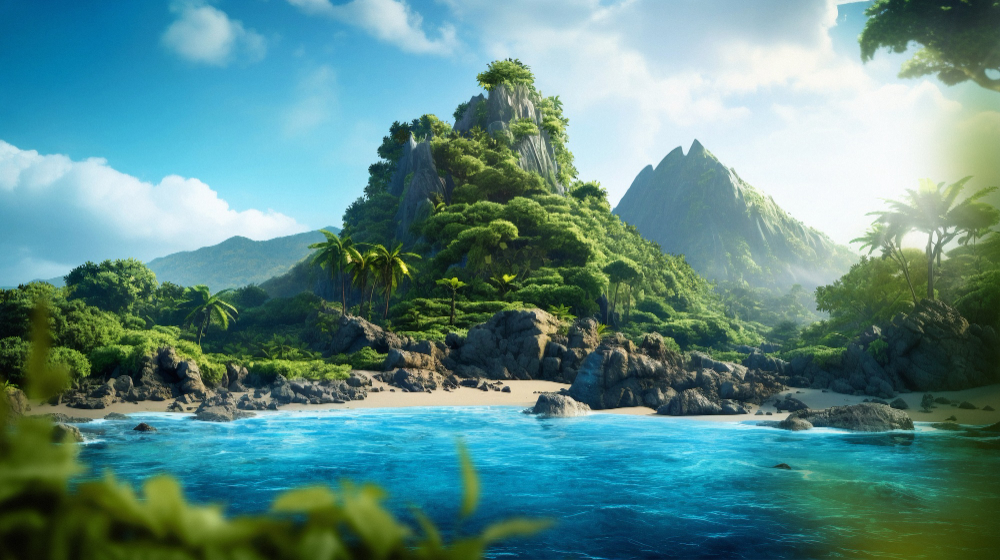Introduction
Imagine waking up to the sound of waves gently lapping on the shore, the sight of turquoise water sparkling under the sun, and the smell of fresh sea breeze. Imagine exploring a tropical island with lush green forests, colorful coral reefs, and diverse wildlife. Imagine experiencing the rich culture and history of the people who call these islands home.

These are not just fantasies, but realities for many of the world’s most beautiful islands. These natural wonders are not only sources of awe and inspiration, but also precious assets that provide vital ecosystem services, support livelihoods, and enhance well-being. They are treasures that we should cherish and protect for ourselves and future generations.
In this blog post, we will take you on a journey to some of the most breathtaking islands on Earth, each with its own unique charm and beauty. We will also discuss the threats that these island ecosystems face, and why it is important to preserve them. Finally, we will share some ways that you can contribute to conservation efforts and help safeguard these island gems for posterity.
Exploring Earth’s Natural Masterpieces
The world is blessed with countless islands, each with its own distinct features and attractions. Here are some of the most stunning examples that showcase the diversity and beauty of island environments:
- The Maldives: This archipelago of over 1,000 islands in the Indian Ocean is renowned for its white-sand beaches, crystal-clear water, and luxurious resorts. The Maldives is also home to one of the world’s richest marine ecosystems, with over 2,000 species of fish, 200 species of coral, and 21 species of whales and dolphins. The Maldives is a popular destination for snorkeling, diving, and surfing, as well as for romantic getaways and honeymoons.
- Seychelles: This island nation in the Indian Ocean consists of 115 islands, each with its own character and charm. Seychelles boasts some of the most pristine and diverse natural environments in the world, with granite mountains, tropical forests, coral reefs, and mangroves. Seychelles is also a hotspot for biodiversity, hosting endemic species such as the giant tortoise, the coco de mer palm, and the black parrot. Seychelles is a paradise for nature lovers, adventurers, and culture enthusiasts, offering activities such as hiking, sailing, fishing, and exploring the Creole heritage.
- Bora Bora: This volcanic island in the South Pacific is often considered the most beautiful island in the world, and for good reason. Bora Bora is surrounded by a lagoon and a barrier reef, creating a stunning contrast of blue and green hues. The island is also famous for its overwater bungalows, which offer unparalleled views and comfort. Bora Bora is a dream destination for relaxation, romance, and recreation, with options such as swimming, kayaking, jet skiing, and parasailing.
- Palawan: This island province in the Philippines is known as the “last frontier” of the country, due to its untouched and diverse natural beauty. Palawan is home to the Puerto Princesa Subterranean River National Park, a UNESCO World Heritage Site that features an underground river and cave system. Palawan is also home to the Tubbataha Reef National Marine Park, another UNESCO World Heritage Site that hosts a rich coral reef and marine life. Palawan is a haven for ecotourism, with opportunities such as wildlife watching, island hopping, and cultural immersion.

These are just some of the examples of the world’s most beautiful islands, but there are many more to discover and appreciate. Each island has its own natural beauty, biodiversity, and cultural significance, making them invaluable and irreplaceable.
Threats to Island Ecosystems
Unfortunately, these pristine island environments are under threat from various factors, both natural and human-induced. Some of the major challenges facing island ecosystems are:
- Climate change: Climate change is one of the most serious and urgent threats to island ecosystems, as it affects multiple aspects of their functioning and survival. Some of the impacts of climate change on islands include rising sea levels, which can erode coastlines, submerge land, and increase flooding and salinization; ocean acidification, which can damage coral reefs and reduce their ability to provide habitat and food for marine life; and extreme weather events, such as storms, droughts, and heat waves, which can disrupt ecosystems, damage infrastructure, and endanger lives and livelihoods.
- Human activities: Human activities, such as over-tourism, pollution, and habitat destruction, can also pose significant threats to island ecosystems. Over-tourism can lead to overcrowding, congestion, waste generation, and depletion of natural resources, as well as social and cultural conflicts. Pollution can contaminate water, soil, and air, and harm the health of humans and wildlife. Habitat destruction can result from land conversion, deforestation, mining, and urbanization, and can reduce the area and quality of natural habitats, and cause fragmentation and loss of biodiversity.
These threats can have severe and lasting consequences for island ecosystems, as they can compromise their resilience, functionality, and sustainability. According to a report by the International Union for Conservation of Nature (IUCN), more than half of the world’s island species are threatened with extinction, and more than 70% of the world’s coral reefs are at risk of degradation or collapse. These alarming statistics highlight the urgency and importance of conservation efforts to protect these island gems.
The Importance of Preservation
Preserving island ecosystems is not only a moral duty, but also a smart and strategic choice. Island ecosystems provide numerous benefits and services that are essential for human well-being, such as:
- Ecological value: Island ecosystems support a high level of biodiversity, as they host many endemic and rare species that are found nowhere else on Earth. These species contribute to the genetic diversity and evolutionary potential of life on Earth, and can also offer potential sources of food, medicine, and other useful products. Island ecosystems also provide important ecosystem services, such as carbon sequestration, water purification, nutrient cycling, and climate regulation, that help maintain the balance and health of the planet.
- Economic value: Island ecosystems generate significant economic value, as they attract millions of tourists and visitors every year, who spend money on accommodation, transportation, food, and entertainment. Tourism is one of the main sources of income and employment for many island communities, and can also stimulate other sectors, such as agriculture, fisheries, and handicrafts. Island ecosystems also provide other economic benefits, such as fisheries, forestry, and renewable energy, that can support livelihoods and development.
- Cultural value: Island ecosystems have a rich and diverse cultural value, as they reflect the history, identity, and heritage of the people who live on them. Islands have been the cradle of many civilizations, religions, languages, and arts, and have shaped the worldviews and values of many cultures. Islands also have a spiritual and aesthetic value, as they inspire awe, wonder, and appreciation among people, and foster a sense of connection and belonging.
These values and benefits demonstrate the importance of preserving island ecosystems, not only for their own sake, but also for ours. By protecting these natural treasures, we are also protecting our own interests and well-being, as well as those of future generations.
Ways to Contribute to Conservation Efforts
You may be wondering, what can I do to help preserve these island gems? The good news is, there are many ways that you can contribute to conservation efforts, both big and small, and make a positive difference. Here are some suggestions that you can try:
- Travel responsibly: If you are planning to visit an island destination, make sure that you travel responsibly and minimize your environmental impact. You can do this by choosing eco-friendly accommodation and transportation options, following the local rules and regulations, respecting the culture and customs of the host community, avoiding activities that can harm the wildlife or the habitat, and reducing your waste and carbon footprint. You can also support local businesses and products, and participate in volunteer or educational programs that promote conservation and awareness.
- Support conservation organizations and initiatives: You can also support conservation organizations and initiatives that work to protect island ecosystems and their inhabitants. You can do this by donating money or resources, joining campaigns or petitions, signing up for memberships or newsletters, or spreading the word about their work and achievements. You can also volunteer your time and skills, and get involved in conservation projects or activities that suit your interests and abilities. Some of the reputable conservation organizations that focus on island ecosystems are:
- Island Conservation: This organization works to prevent extinctions by removing invasive species from islands, and restoring their native ecosystems and wildlife.
- The Nature Conservancy: This organization works to conserve the lands and waters on which all life depends, and has a special focus on islands, where it protects habitats, restores coral reefs, and supports sustainable livelihoods.
- Global Island Partnership: This organization works to promote collaboration and action among island leaders and stakeholders, and to mobilize resources and commitments for island conservation and sustainable development.
- Advocate for policies and actions that prioritize environmental protection and sustainable tourism. You can also advocate for policies and actions that prioritize environmental protection and sustainable tourism and hold governments and businesses accountable for their impacts and responsibilities. You can do this by contacting your representatives and officials, expressing your views and concerns, and urging them to take action. You can also join or organize movements and events that raise awareness and demand change.
Conclusion
Islands are some of the most beautiful and precious natural assets on Earth, and they deserve our respect and protection. They provide us with ecological, economic, and cultural benefits that enrich our lives and well-being. They also host a wealth of biodiversity and ecosystem services that sustain the health and balance of the planet. However, these island gems are under threat from climate change and human activities, and they need our collective action to preserve them for future generations.
We hope that this blog post has inspired you to appreciate and protect the world’s most stunning island paradises. We also hope that you have learned some ways that you can contribute to conservation efforts and make a positive difference. By traveling responsibly, supporting conservation organizations and initiatives, and advocating for policies and actions that prioritize environmental protection and sustainable tourism, you can help safeguard these natural treasures for posterity.
Call to Action
If you enjoyed this blog post and found it informative and useful, please share it with your friends and family, and spread awareness about the importance of preserving island ecosystems. You can also follow the links below to learn more about the conservation organizations and resources that we mentioned and find out how you can get involved and support their work. You can also leave us a comment and share your own experiences and ideas for protecting our planet’s island gems. Thank you for reading, and remember we are all stewards of the environment and ambassadors for island conservation.